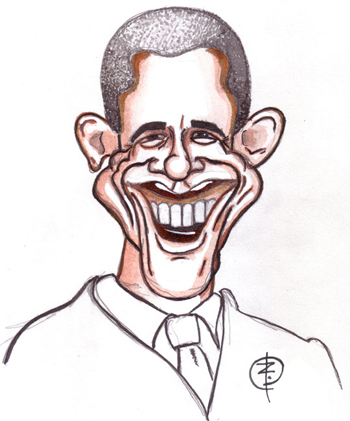Is Obama A Wimpy Professor?
The Ivy League is taking over our national security! The neocons rally against the prez's war conduct.
 There are a lot of things about the Libyan intervention that could go wrong. Already the allies are bickering with each other about who takes the lead. The French are quibbling about NATO's role. President Obama keeps indicating that America will be out before it's really in. And so on.
There are a lot of things about the Libyan intervention that could go wrong. Already the allies are bickering with each other about who takes the lead. The French are quibbling about NATO's role. President Obama keeps indicating that America will be out before it's really in. And so on.
But is the principal problem that Obama, as Charles Krauthammer complains, is running a classic Ivy League professor's war? The gravamen of Krauthammer's attack is that Obama has been unwilling to play the role of a true leader, rallying the troops, crying for victory. Instead, he's constructed an international coalition and even deigned to seek the approval of the Arab League. Bad, bad, bad.
Krauthammer is addicted to the great man version of history. He has a constricted, static view of leadership that is pure neocon--Churchill or bust. In Krauthammer's dramaturgy, America must go it alone (except that Churchill, after all, needed an alliance with America). But why bother with pesky allies? America is an Atlas that can shoulder any burden. As Krauthammer expostulates,
A model of international cooperation. All the necessary paperwork. Arab League backing. A Security Council resolution. (Everything but a resolution from the Congress of the United States, a minor inconvenience for a citizen of the world.) It’s war as designed by an
Ivy League professor.
But it's hardly surprising that Obama would seek to spread the burden. America is mired in two wars, the second one a conflict of choice championed by none other than Krauthammer. Obama was understandably reluctant to intervene in what amounts to a civil war in Libya. His approach wasn't so much Ivy League professor, at least initially, as realist. Coalitions have their drawbacks: they usually break up once an aggressor has been defeated and each side seeks to offer its own interpretation of what constitutes victory. But there is no reason that America should have sought to go it alone in Libya. Indeed, a different, more jaundiced interpretation than Krauthammer's might be that Obama is simply using international cooperation as a fig leaf to unleash American firepower, partly in revenge for Col. Qaddafi's misdeeds in the past, partly to ensure that the Arab revolutions do not peter out. Syria, after all, is experiencing large demonstrations.
Another interpretation of Krauthammer's column is possible as well. It would be this: the neocons blamed either Donald Rumsfeld or George W. Bush for failing to fight the war correctly in Iraq. The problem, they argued, wasn't the war. It was they way it was fought. Krauthammer appears to be preparing a similar indictment of Obama (David Rieff, writing in the New Republic, contends that the liberal hawks are also preparing the case against Obama for not intervening aggressively enough). Meanwhile, another faction on the right is arguing that Obama is acting like an American Caesar, trampling on domestic liberties by unconstitutionally going to war by executive fiat--a claim that, as David Rivkin and Lee Casey show in an excellent column, is entirely bogus. In any case, as I'm not the first to note, Obama can hardly be both--a wimpy professor and a tyrant ruthlessly overriding Congress.
It might be argued, then, that the conflict in Libya is really a two-front war. The attacks on Obama may not have all that much to do with Libya, at least when it comes to the profusion of columnists and intellectuals (many of whom, by the way, can trace their own pedigrees to the Ivy League) who have exhorted the president to go to war. For them it appears to be primarily an opportunity to score points against Obama. So much for the Libyan people themselves.
